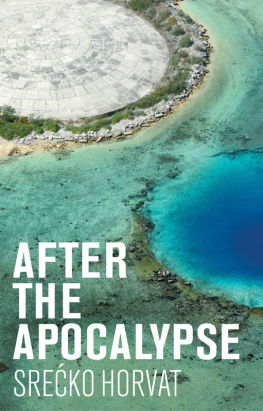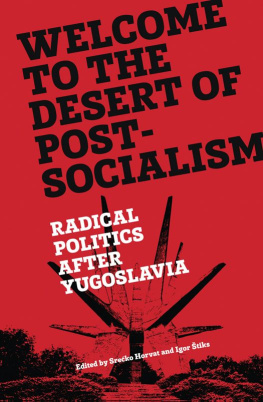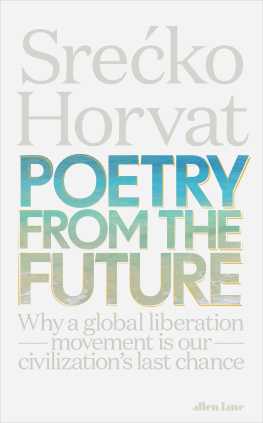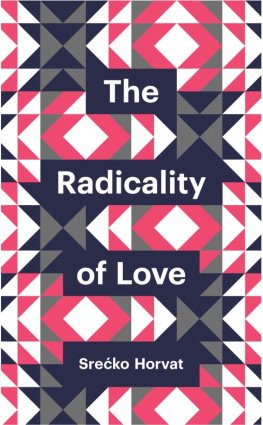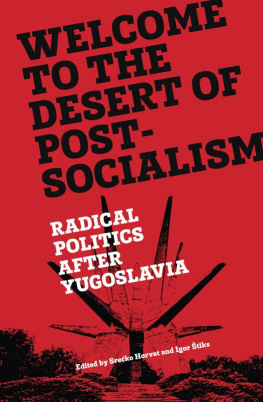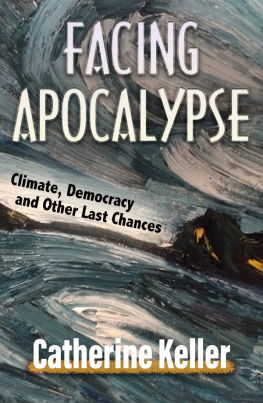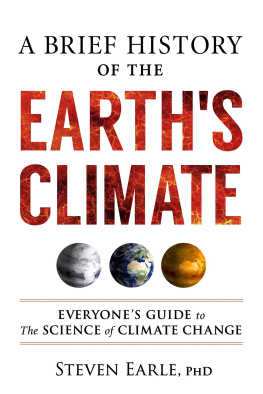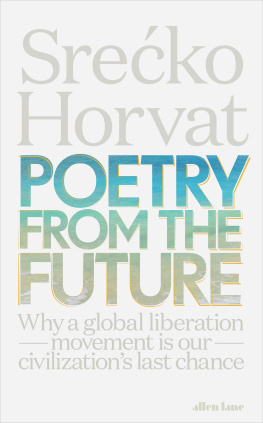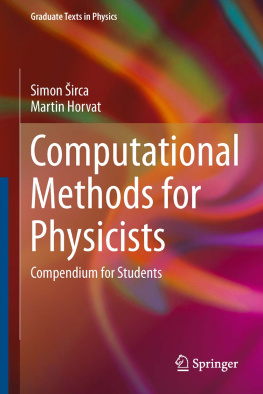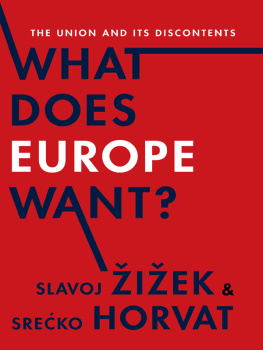
After the Apocalypse
Sreko Horvat
polity
Copyright Page
Copyright Sreko Horvat 2021
The right of Sreko Horvat to be identified as Author of this Work has been asserted in accordance with the UK Copyright, Designs and Patents Act 1988.
First published in 2021 by Polity Press
Polity Press
65 Bridge Street
Cambridge CB2 1UR, UK
Polity Press
101 Station Landing
Suite 300
Medford, MA 02155, USA
The author wishes to thank KTH Centre for the Future of Places (CFP) and Director Dr. Tigran Haas for the research grant for the project.

All rights reserved. Except for the quotation of short passages for the purpose of criticism and review, no part of this publication may be reproduced, stored in a retrieval system or transmitted, in any form or by any means, electronic, mechanical, photocopying, recording or otherwise, without the prior permission of the publisher.
ISBN-13: 978-1-5095-4007-5
ISBN-13: 978-1-5095-4008-2 (pb)
A catalogue record for this book is available from the British Library.
Library of Congress Cataloging-in-Publication Data
Names: Horvat, Sreko, author.
Title: After the apocalypse / Srecko Horvat.
Description: Cambridge, UK ; Medford, MA : Polity, 2021. | Includes bibliographical references. | Summary: A rollercoaster ride through the world after the Apocalypse with a simple message: either we change course or we face mass extinction-- Provided by publisher.
Identifiers: LCCN 2020039921 (print) | LCCN 2020039922 (ebook) | ISBN 9781509540075 | ISBN 9781509540082 (pb) | ISBN 9781509540099 (epub)
Subjects: LCSH: Civilization, Modern--21st century. | Regression (Civilization)
Classification: LCC D862.3 .H67 2021 (print) | LCC D862.3 (ebook) | DDC 909.83/2--dc23
LC record available at https://lccn.loc.gov/2020039921
LC ebook record available at https://lccn.loc.gov/2020039922
by Fakenham Prepress Solutions, Fakenham, Norfolk NR21 8NL
The publisher has used its best endeavours to ensure that the URLs for external websites referred to in this book are correct and active at the time of going to press. However, the publisher has no responsibility for the websites and can make no guarantee that a site will remain live or that the content is or will remain appropriate.
Every effort has been made to trace all copyright holders, but if any have been overlooked the publisher will be pleased to include any necessary credits in any subsequent reprint or edition.
For further information on Polity, visit our website: politybooks.com
Acknowledgements
To write a book about the Apocalypse even as it is in the process of unfolding makes an already difficult task even harder. We are all living through it, deeply entangled and personally shaken by its revelations, engulfed by its warnings and, yet, the attempt to imagine the unimaginable, to grasp the supraliminal, needs to be taken if we are to understand what is at stake, namely extinction. This book is not only an attempt to bridge these two tensions overwhelming reality and the reality that is to come it is, like every book, also a product of these times. I started to write it on the island of Vis, as a sort of continuation of my previous book Poetry from the Future (2019) and its chapter Its the End of the World (as We Know It), and, after various travels to the future of places (including Chernobyl), I sent the manuscript to my publisher in late January 2020. As I was awaiting feedback, I heard about a virus in China that would soon change the course of history not only as a dark real existing dystopia, but also as a sort of rupture to open new perhaps emancipatory possibilities for a world after the Apocalypse. In the meantime, I was stuck in Vienna during the COVID-19 lockdown until late May 2020 and received a message from my publisher John Thompson and two anonymous reviews of the first draft that easily convinced me, as hard as it was, to rewrite the whole book and to include the ongoing pandemic as an inherent part of the eschatological tipping points that are being explored in this book. My deep gratitude goes to John, who published my first book written in English, The Radicality of Love, and who was immediately interested in publishing After the Apocalypse. Thanks to his never-ending patience, valuable comments and a few disagreements, the manuscript turned into its current form. I also want to thank the two anonymous reviewers who forced me to carefully rework some crucial parts of it; Sarah Dancy for the diligent copy-editing; and Julia Davies for her editorial support throughout the whole process.
This book started its life long before the current COVID-19 pandemic and the acceleration of catastrophes throughout the world, including climate crisis, civil wars and the enduring nuclear threat that are turning extinction not into a future event that is yet to come, but into something that might already become history once this book is published. If one day in March 2018 I hadnt met Tigran Haas in Stockholm, this book would perhaps never be written. I was invited by Tigran to deliver a lecture at the Center for the Future of Places at the KTH Royal Institute of Technology and immediately afterwards he told me I must write a book that would explore the future of places in relation to the Apocalypse. Thanks to him and the generous support of the Center for the Future of Places, I decided to dive into this abyss and examine both the spatial and temporal implications of the Apocalypse. Only through numerous thoughts, dreams and fears shared with my fellow travellers, my suputnik(s) or sputnik(s), did this book take its current shape. Perhaps a more precise term would be supatnik (fellow sufferer), as they had to endure my endless obsession with the end and the after. First and foremost, my thanks goes, as always, to Saa Savanovi, not only for her critical comments and numerous readings, but also for making the world after the Apocalypse a more joyful and hopeful place. Among my fellow travellers, whose list is long and always incomplete, those who especially helped in this endeavour are Franco Bifo Berardi, Yanis Varoufakis, Darko Suvin, Boris Buden, Renata vila, Judith Meyer, Maja Kantar, Andrej Nikolaidis, Marko Pogaar, Valerio Baak and Filip Balunovi. This book was finished in the midst of a pandemic which, once again, proved that politics of friendship is always connected to survival and resistance.
Table of Contents
List of Illustrations
- Introduction: Nine Theses on Apocalypse
- Chapter 1
- Chapter 2
- Chapter 3
- Postscriptum: Revelation of COVID-19
Guide
Pages
Epigraph
Please note:
the post-apocalyptic
fiction section
has been moved to
Current Affairs.
Note
- A sign in front of a bookstore in Massachusetts, November 2016, shortly after Donald Trump was elected President of the United States; sign at the window of a bookstore in Fowey, Cornwall, UK, January 2019, during the Brexit negotiations; sign in front of a bookstore in the fire-ravaged village of Cobargo, New South Wales, Australia, January 2020.
Introduction: Nine Theses on Apocalypse
A fire broke out backstage in a theatre. The clown came out to warn the public; they thought it was a joke and applauded. He repeated it; the acclaim was even greater. I think thats just how the world will come to an end: to general applause from wits who believe its a joke.
Next page
